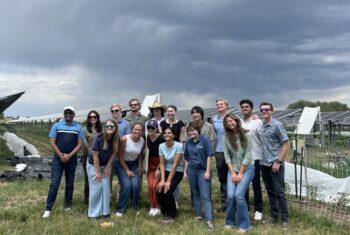Introducing Scout’s Revamped Mentorship Program

Mentorship is one of the most powerful tools for personal and professional growth, which is why we've made it an integral part of our personal and professional development at Scout, creating opportunities for our team members to connect, learn, and grow together. We launched our six-month inaugural program last July. While successful, we implemented feedback from last year's participants to better equip both mentors and mentees for success and create a more meaningful experience for our new program, which we launched this September. With a focus on deeper connections, structured resources, and targeted development areas, our revamped mentorship program is empowering both mentors and mentees to thrive in new ways.
Crafting a Solid Mentorship Framework
Going into the new program, we looked to solidify the foundation of the program with a more thoughtful approach to its structural framework. To set up the framework, prospective mentors and mentees filled out a detailed interest form in the months preceding the program. Using responses form the interest form we matched interested Scouts based on skill alignment, mentor choice, and availability. While matching one mentor with one mentee is preferable, our program provides plans for mentors with multiple mentees centered around group sessions that help to meet scheduling demands and encourage a collaborative approach to discussions.
We've provided additional structure through new resources meant to help prepare participants for their meetings, such as our Professional Development Template and our Motivational Pie framework. Our Motivational Pie framework, for example, determines what drives Scouts to do their best work, regardless of broader business objectives or practices, and gives our mentors a more personalized and realistic view of their mentee's values and motivators by asking Scouts what motivates them at work, how important those motivators are (out of 100%), and asking them to rate their satisfaction with each of these motivators. Combined with the similar Professional Development Framework, where Scouts can develop their professional goals and look toward the future, our participants are given ample opportunity to reflect and focus on individual values and motivators to best prepare and inspire them for their meetings.
Elevating Professional Development Focus Areas
With a solid framework in place, we turned our focus to establishing four critical performance impact areas (PIAs) designed to equip mentees with the skills and behaviors to excel in their roles and contribute to Scout's success:
- Ownership: Taking initiative and leading collaboratively with confidence.
- Data-driven conclusions: Developing analytical thinking and decision-making skills.
- Business acumen: Broadening understanding of the company and industry.
- Project management: Tackling complex challenges efficiently through preparation and organization.
Additionally, these PIAs served as the foundation for our new Career Development Framework (CDF), which emphasizes personal skill development. The PIAs provide alignment to business goals at Scout, while the CDF provides specific supplemental skills and expectations that mentees can reference when aiming to grow their careers through the mentorship program. Together, these frameworks create a strong foundation for professional development in a more focused capacity, and they ensure a holistic professional development program at Scout. While it is recommended to structure individual mentorship plans around these topics, we emphasize flexibility for our mentors and mentees in the way they organize the topical structure of their individual relationship. As we progress further in the program, we will hear from some mentees and mentors about what PIAs they are working on and how they've used them in practice.
Championing Collaboration
With collaboration at the core, we introduced a new 12-month formal program timeline aimed at meaningful, long-term impact. A notable expansion from the previous six-month timeline, the full year provides participants the opportunity to set and pursue more ambitious, long-term goals with their mentors, with more time to assess progress, adapt plans, and apply lessons learned. By including more robust training materials and a more streamlined matching process, most of the time spent in the formal program timeframe can now be dedicated to skill development and continuous learning. Looking ahead, we hope to include reverse mentorship in future programs, along with continuously expanding and improving our training resources.
As this year's mentorship program unfolds, we're eager to see its impact on our team. Stay tuned for the next article, where we'll share updates, participant insights, and key takeaways from this year's journey.

